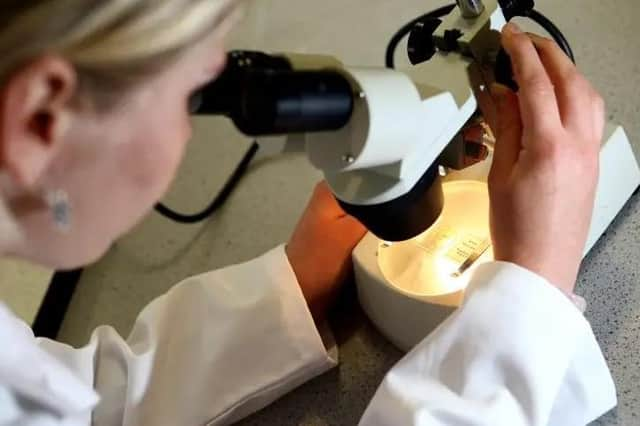Cervical Screening Awareness Week: Figures show one in three Northamptonshire are not having smear tests


Nearly one in three Northamptonshire women are regularly skipping routine smear tests which can detect early stages of cancer.
Charity Jo's Cervical Cancer Trust believes many are avoiding the straightforward procedures through fear, embarrassment, or a lack of understanding of what they involve.
Advertisement
Hide AdAdvertisement
Hide AdCurrently in full swing, the charity's annual Cervical Screening Awareness Week aims to highlight the importance of regular screenings and help those with concerns about getting the tests.
Smear tests ae offered to women and people with a cervix who are aged between 25 and 49 every three years. Those aged 50 to 64 get invitations every five years. A small sample of cells is taken and checked for pre-cancerous abnormalities.
Just 70 percent of the 214,500 eligible patients in Northamptonshire at the end of 2021 attended a screening and had a clear result, according to NHS Digital data.
Rates varied between the age groups with a higher proportion in the 50-64 bracket being screened.
Advertisement
Hide AdAdvertisement
Hide AdNorthamptonshire figures match those across England with 70 percent of eligible women having an adequate screening by the end of 2021 against a national target of 80 percent.
In 2019, before the Covid pandemic, the figure stood at 72 percent.
Jo’s Trust chief executive, Samantha Dixon, said: “There is no one reason behind falling cervical screening attendance, instead a wide range of factors exist.
"These include NHS pressures, fear, embarrassment and not knowing what the test is for or thinking it is relevant.
Advertisement
Hide AdAdvertisement
Hide Ad"Cervical Screening Awareness Week is the ideal time to provide tips, reminders and signpost to support about the test, but work is needed all year round to tackle barriers and support more women and people with a cervix to attend this potentially life-saving test.”
Around 2,700 women are diagnosed with cervical cancer in England each year and approximately 690 die from the disease, according to NHS statistics which pre-date the pandemic.
But Cancer Research UK estimates that cervical screening saves at least 2,000 lives annually in the UK.
And a recent study suggests as many cancers could still be prevented by women being screened every five years instead of every three.
Advertisement
Hide AdAdvertisement
Hide AdResearchers at King’s College London said that screening women aged 24 to 49 who test negative for human papillomavirus (HPV) at five-year intervals curbed as many cancers as screening every three years.
The study of 1.3 million women in England found that women in this age group were less likely to develop clinically relevant cervical lesions, abnormal changes of the cells that line the cervix known as CIN3+, and cervical cancer three years after a negative HPV screen compared to a negative smear test.
Michelle Mitchell, Cancer Research UK’s chief executive, said: “This builds on findings from years of research showing HPV testing is more accurate at predicting who is at risk of developing cervical cancer compared to the previous way of testing.
“As changes to the screening programmes are made, they will be monitored to help ensure that cervical screening is as effective as possible for all who take part.
“It’s important to remember, screening is for people without symptoms. So, if you notice any unusual changes for you, do not wait for a screening invitation – speak to your doctor.”
